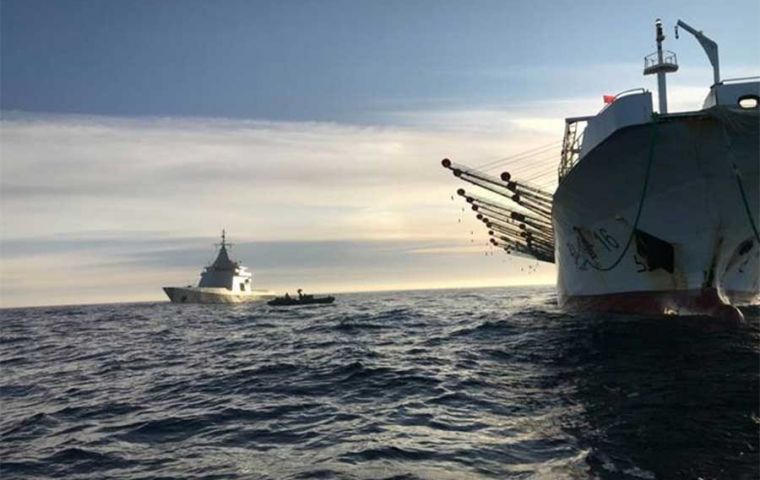MercoPress. South Atlantic News Agency
Argentina allows Chinese fishing fleet into its EEZ to take refuge from a massive storm
 Chinese jiggers packed along mile 201, with an Argentine naval vessel keeping track of the activities
Chinese jiggers packed along mile 201, with an Argentine naval vessel keeping track of the activities The Argentine navy allowed a fleet of 259 Chinese fishing vessels to enter the country's EEZ (Economic Exclusive Zone) to take refuge from a massive storm with seven meters high waves and winds of more than a hundred kilometers per hour. The Ministry of Defense also announced that once the storm was over the Chinese vessels returned to international waters.
A navy aircraft in coordination with the Maritime Joint Command, since March first, kept track of the fleet to ensure that no vessel felt tempted to try fishing in Argentina's EEZ. This was achieved by a meticulous monitoring of the vessels' speed, their course and the AIS, Automatic Identification System, plus night satellite photos when the jiggers normally operate to attract squid.
This practice is designated in naval terms as 'right of innocent passage' helping to avoid conflicts and in this particular case, according to the Argentine navy, China's main maritime authority made the formal request to protect its vessels that were operating in the so called mile 201, just outside the EEZ.
Under the UN Convention on the Law of the Sea, fishing vessels can sail into the coastal country zone as long as the they abstain from any fishing activity, have all lights for fishing turned off, plus all the fishing gear clearly on deck and safely moored.
The Argentine navy in a release pointed out to the tasks which its Maritime Transit Command implements in the safeguard of the country's interests, particularly with a dissuasive presence, air and sea, to impede any trespassing in jurisdictional waters.
Said this it must also be mentioned that the Argentine Institute of Environment Policies, based on satellite information from Global Fishing Watch, point out that Chinese jiggers during the last decade admittedly increased their catches an estimated 800%, operating along the fringes of the EEZ limit also known as mile 201.
And even when this position in the high seas, --with the occasional chase of some intruder caught red-handed--, the fact is that the massive Chinese presence does have a huge impact on the eco system particularly since squid is a highly migrating cephalopod circulating in the South Atlantic. Besides squid, hake, kingclip and toothfish, are the main exports of Argentine fisheries, also highly coveted by the Chinese fleet. (Source Daniel Santoro - Clarin)




Top Comments
Disclaimer & comment rules-

Read all commentsOf course they do! Bon apetit et bon chance!!
Mar 09th, 2024 - 10:02 am +1Commenting for this story is now closed.
If you have a Facebook account, become a fan and comment on our Facebook Page!